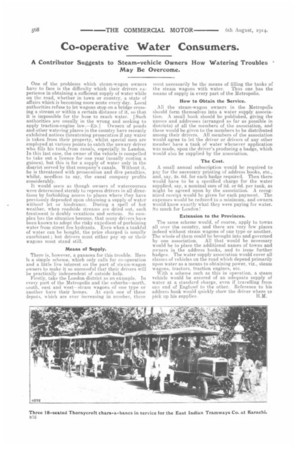Co-operative Water Consumers.
Page 12

If you've noticed an error in this article please click here to report it so we can fix it.
A Contributor Suggests to Steam-vehicle Owners How Watering Troubles May Be Overcome.
One of the problems which steam-wagon owners have to face is the difficulty which their drivers experience in obtaining a sufficient supply of water while on the road, whether in town or country, a state of affairs which is becoming more acute every day. Local authorities refuse to let wagons stop on a bridge crossing a stream or within a certain distance of it, so that it is impossible for the hose to reach water. [Such -authOrities are usually in the wrong and seeking to apply traction-engine law.—En.] Owners of ponds and other watering places in the country have recently exhibited notices threatening prosecution if any water is taken from their property, whilst special men are employed at various points to catch the unwary driver who fills his tank,from canals, especially in London. In this last ease, the owner of the vehicle is compelled to take out a licence for one year (usually costing a guinea), but this is for a supply of water only in the district served by that company's canals. Without it, he is threatened with prosecution and dire penalties, whilst, needless to say, the canal company profits considerably.
It would seem as though owners of watercourses were determined sternly to repress drivers in all directions by forbidding access to places where they have previously depended upon obtaining a supply of water without let or hindrance. During a spell of hot weather, when roadside streams are dried out, such treatment is doubly vexatious and serious. So complex has the situation become, that many drivers have been known to adopt the risky expedient of purloining water from street fire hydrants. Even when a tankful of water can be bought, the price charged is usually exorbitant ; but drivers must either pay up or their wagons must stand still.
Means of Supply.
There is, however, a panacea for this trouble. Here is a simple scheme, which only calls for co-operation and a little live interest on the part of steam-wagon owners to make it so successful that their drivers will be practically independent of outside help.
Firstly, take the London district as an example. In every part. of the Metropolis and the suburbs—north, south, east and west—steam wagons of one type or another have their homes. At each one of these depots, which are ever increasing in number, there must necessarily be the means of filling the tanks of the steam wagons with water. Thus one has the means of supply in every part of the Metropolis.
How to Obtain the Service.
All the steam-wagon owners in the Metropolis should form themselves into a water supply association. A small book should be published, giving the names and addresses (arranged as far as possible in districts) of all the members of the association, and these would be given to the members to be distributed among their drivers. All members of the association would agree to let the driver or drivers of any other member have a tank of water whenever application was made, upon the driver's producing a badge, which would also be supplied by the association.
The Cost.
A small annual subscription would be required to pay for the necessary printing of address books, etc., and, say, 2s. 6d. for each badge required. Then there would have to be a specified charge for the water supplied, say, a nominal sum of ad. or 6d, per tank, as might be agreed upon by the association. A recog nized receipt would be given for each payment. The expenses would be reduced to a minimum, and owners would know exactly what they were paying for water. So much for London Extension to the Provinces.
The same scheme would, of course, apply to towns all over the country, and there are very few places indeed without steam wagons of one type or another. The whole of them could be brought into and governed by one association. All that would be necessary would be to place the additional names of towns and owners in the address books, and to issue further badges. The water supply association would cover all classes of vehicles on the road which depend primarily upon water as a means to obtaining power, viz., steam wagons, tractors, traction engines, etc.
With a scheme such as this in operation, a steam vehicle would be assured of an adequate supply of water at a standard charge, even if travelling from one end of England to the other. Reference to his address book would quickly show the driver where to
pick up his supplies. WM.
























